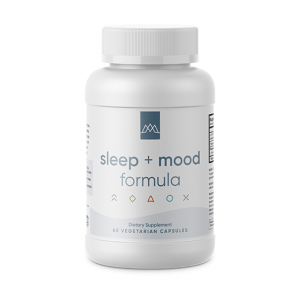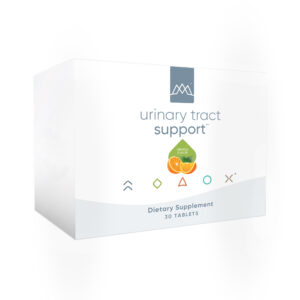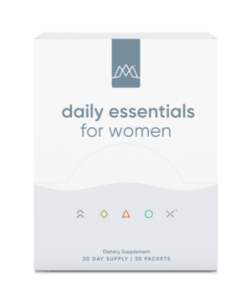- Women and Disease Risk
- Find Your Ideal Weight to Reduce Your Disease Risk
- 7 More Ways to Stay Healthy
March is Women’s History Month. During this month, we honor the voices and contributions of past, present, and future women around the world.1 Women’s History Month makes a great time to reflect on women’s health.
The good news is that overall, women are healthier than men.2 You’re more likely to make better food choices.3 You’re also more proactive about your health, visiting your healthcare practitioner more often than men.4
As a result, you’re more likely to live longer: On average about six to eight years longer, in fact, than men.5
On the other hand, society doesn’t always acknowledge the health conditions that women experience and struggle with. Even when we do, we might not prioritize those conditions, which can have a detrimental impact over time.
Consider urinary tract conditions (UTIs), which aren’t always obvious but can create symptoms including pain.
With UTIs, bacteria travel up to your bladder and eventually the kidneys. Women have shorter urethras, allowing bacteria to more quickly invade the bladder.6 As a result, UTIs happen more often with women.7
Concentrated amounts of specific nutrients can optimize your body’s ability to fight UTIs and keep them at bay.8 MaxLiving Urinary Tract Support contains ingredients such as cranberry and D-mannose which can help maintain a healthy urinary tract and help reduce the spread of UTI causing bacteria.
Alcohol is another problem that impacts men and women differently. While men are likely to struggle with addiction, alcohol abuse and alcoholism have more serious repercussions for women. Over time, alcohol abuse can increase your risk of problems including breast cancer, heart disease, and fetal alcohol syndrome.9
When it comes to health, you have specific situations and needs as a woman, including pregnancy and menopause. Other conditions impact women more often or differently than men.10
Women and Disease Risk
Women and men aren’t equal when it comes to health. Your biology partially impacts those differences. So do other things, such as your behaviors and decisions.11
Certain diseases and conditions impact women differently than men. Among them include:
- Breast and cervical cancers. Every year, about half a million women die from cervical cancer. Half a million more die from breast cancer.12
- Women struggle with more mood disorders including anxiety and depression than men.13 Depressive disorders impact twice as many women: Around 12 million every year, compared to around six million men.14
- Heart disease, the leading cause of death for men and women, contributes to around 29 percent of deaths for women.15 Compared with men, women have a higher risk of death from heart attacks.16
- Women have a higher risk of osteoporosis, which thins and weakens bones, making them easier to break. Half of the women over 50 will have an osteoporosis-related fracture in their lifetime.17
- About 80 percent of autoimmune diseases occur in women.18 With autoimmune diseases, your immune system mistakes a specific part of your body — say, your joints or skin — as a potential threat, attacking that healthy area.19
Multiple factors contribute to these and other problems. One of them is nutrient deficiencies.
These deficiencies can show up in subtle or not-so-obvious ways. You might find wounds are slow to heal. Your bones can feel painful. Perhaps you’re losing more hair than you would like.20
Nutrient deficiencies can also contribute to bigger health risks including heart disease, cancer, and obesity. Almost half of American adults have one or more preventable chronic diseases. Many of them have a poor diet and not enough exercise.21
That’s actually good news because it puts the power to be healthy in your control. The right approach to health and wellbeing can help you keep a healthy weight and reduce your risk of disease in your 40s, 50s, 60s, and beyond.
Find Your Ideal Weight to Reduce Your Disease Risk
If you want to reduce your risk of these and other issues, find an ideal weight. A healthy weight can lower your risk of heart disease, stroke, diabetes, high blood pressure, and many different cancers.22
While more adult men are overweight, obesity rates are higher for women. Almost 40 percent of adult women are obese, compared with 35 percent for men.23 Overall, two out of every three American women 20 and older are overweight or obese.24
Part of that is biological: Women have more body fat than men.25 Regardless, being obese increases your risk of many health conditions.26 Taking the right steps to reach your goal weight impacts your health, happiness, and so much more.
Numerous factors impact your weight and overall health. They include your age, genetics, metabolism, and what medications you use.27 You can’t always control those things, but you can choose what goes on the end of your fork.
Sugar-sweetened drinks and certain foods such as processed meats can contribute to heart disease, diabetes, and more.28 To maintain a healthy weight and reduce your disease risk, you’ll want to identify and eliminate these problem foods.
Instead, you’ll want to bring in more vegetables, fruits, nuts, seeds, and wild-caught cold-water fish. These foods can lower your risk of dying from heart disease, diabetes, and other diseases.29
Research shows that many women don’t eat enough fruits, vegetables, and seafood. Even if you are eating these foods, getting certain nutrients can be a challenge.
Consider omega-3 fatty acids, which are found in seafood as well as a few plant foods including flaxseeds.30
Many Americans don’t get enough of these anti-inflammatory fatty acids in their diet. In fact, we eat about 20 times more inflammatory fatty acids.31 Too many inflammatory fats from foods like vegetable oils and processed meats, and not enough anti-inflammatory fats, can contribute to many chronic diseases including heart disease and cancer.32
MaxLiving’s Core Plan provides a healthy foundation to stay lean and healthy at any age. This satisfying, practical plan combines the ideal amounts of protein, healthy fats, and the right carbohydrates to reduce inflammation and cultivate vibrant health.
If you’re dealing with specific health concerns, consider the Advanced Plan. While a bit more restrictive than the Core Plan, this provides a solid foundation to help you target specific health goals.
7 More Ways to Stay Healthy
Our Core and Advanced Plans incorporate plenty of delicious, nutrient-rich foods that help you stay lean and healthy.
What you put on your plate matters, but so do lifestyle factors including how you move, think, and live your life. These seven strategies complement your diet and help you feel fabulous at any age.
- Move more. Women who exercise consistently are healthier. You don’t need to become a fitness fanatic or spend hours at the gym to get those benefits:
- Aim for 30 minutes, five times every week, of moderate activity such as brisk walking or dancing. Everything counts and adds up, including parking further away from the grocery store and taking the stairs.
- Consider more vigorous exercise, such as tennis. Your goal should be about 15 minutes a day, five times a week.
- Find time for short bursts of activity throughout your day.
- Strength training several times each week can support strong bones, muscle, and more.33
- For more tips on how to get moving-click here
- Find ways to manage stress. Women report higher levels of stress than men.34 Feeling stressed out becomes a health hazard in many ways. Stressful life events such as job loss or death, for instance, can contribute to conditions including depression.35 Deep breathing, meditation, and yoga can help lower stress levels. So can eating healthy and exercising.36 Find what works for you and do it regularly.
- Get great sleep. Poor sleep can impair your hormone levels, energy levels, motivation to exercise, and much more.37 Those hits can take a toll on your waistline and overall health. Aim for eight hours of solid, uninterrupted sleep every night. Keeping a consistent sleep schedule and a before-bed routine can help. If you have trouble falling or staying asleep, consider a supplement.

- Be proactive about your health. Little habits can yield big returns for your health and wellbeing:
- If you drink alcohol, stick with one glass daily.
- Don’t smoke. If you do, talk with your healthcare practitioner about ways to stop.
- Brush your teeth twice daily and floss every day.
- Work closely with a healthcare professional to address specific health concerns.38
- Be mindful of specific nutrients that can prevent certain conditions or reduce their impact, such as our Urinary Tract Support formula for UTIs.
- Track your progress. What you measure, you can improve. When you track what you eat or how much you move, you can identify strengths, see where you can improve, and stay on track.39 Pen and paper would work here, or you can download specific apps that help track your progress. One study found that people who tracked everything they ate lost twice the amount of weight compared to those who didn’t.40
- Cultivate meaning. Living a purpose-driven life can improve your health and help you live longer.41 How you find your purpose depends on what makes you light up and feel great. That might include meaningful work, community, loving relationships, your pets, and volunteering.42
- Get sufficient nutrients. Nutrient deficiencies can show up in obvious and not-so-obvious ways. You might constantly feel tired or struggle to lose weight.43 Or you could feel depressed.44 Even if you’re eating a healthy diet, you might not get ideal amounts of the anti-inflammatory omega-3 fatty acids and other nutrients that help you stay lean and healthy. That’s where Daily Essentials for Women and Prenatal Daily Essentials can help. Each convenient packet contains the essential nutrients and additional nutrient support to help you thrive. You get all those nutrients in one easy-to-take packet. With these essentials, you can rest assured that you’re meeting all your nutrient needs.
Women’s History Month makes a great time to acknowledge the hard work and important efforts that women have made throughout history and continue to make.
To be at your best, you need to cultivate and maintain great health. When you eat and live well, you have the energy, focus, and confidence to show up as your best self. That’s worth celebrating every month!
References
- https://womenshistorymonth.gov/
- https://tidsskriftet.no/en/2017/06/kronikk/why-are-autoimmune-diseases-more-prevalent-women
- https://www.rush.edu/health-wellness/discover-health/how-gender-affects-health
- https://www.tricitymed.org/2017/06/dont-men-go-doctor-often-women/
- https://www.who.int/gho/women_and_health/mortality/situation_trends_life_expectancy/en/
- https://www.webmd.com/women/guide/your-guide-urinary-tract-infections#1
- https://online.regiscollege.edu/blog/health-issues-specific-womens-health/
- https://www.healthline.com/nutrition/uti-home-remedies#section7
- https://www.cdc.gov/alcohol/fact-sheets/womens-health.htm
- https://www.nichd.nih.gov/health/topics/womenshealth/conditioninfo/whatconditions
- https://www.rush.edu/health-wellness/discover-health/how-gender-affects-health
- https://www.who.int/life-course/news/commentaries/2015-intl-womens-day/en/
- https://www.who.int/life-course/news/commentaries/2015-intl-womens-day/en/
- https://www.webmd.com/women/features/5-top-female-health-concern#1
- https://www.webmd.com/women/features/5-top-female-health-concern#1
- https://online.regiscollege.edu/blog/health-issues-specific-womens-health/
- https://www.aurorahealthcare.org/patients-visitors/blog/osteoporosis-why-it-affects-more-women-than-men
- https://tidsskriftet.no/en/2017/06/kronikk/why-are-autoimmune-diseases-more-prevalent-women
- https://www.healthline.com/health/autoimmune-disorders#causes
- https://www.rush.edu/health-wellness/discover-health/6-signs-nutrient-deficiency
- https://health.gov/our-work/food-nutrition/2015-2020-dietary-guidelines/guidelines/introduction/nutrition-and-health-are-closely-related/
- https://www.hsph.harvard.edu/nutritionsource/healthy-weight/
- https://www.niddk.nih.gov/health-information/health-statistics/overweight-obesity
- https://www.womenshealth.gov/healthy-weight/weight-and-obesity
- https://www.medscape.com/answers/123702-11502/is-obesity-more-common-in-women-or-men
- https://www.onhealth.com/content/1/health_risks_associated_with_obesity
- https://www.womenshealth.gov/healthy-weight/weight-and-obesity
- https://www.health.harvard.edu/blog/10-foods-that-may-impact-your-risk-of-dying-from-heart-disease-stroke-and-type-2-diabetes-2019100717965
- https://www.health.harvard.edu/blog/10-foods-that-may-impact-your-risk-of-dying-from-heart-disease-stroke-and-type-2-diabetes-2019100717965
- https://ods.od.nih.gov/factsheets/Omega3FattyAcids-HealthProfessional/
- https://www.ncbi.nlm.nih.gov/pmc/articles/PMC4808858/
- https://www.ncbi.nlm.nih.gov/pmc/articles/PMC3492709/
- https://www.webmd.com/balance/features/health-tips-heart-mind-body#1
- https://www.nytimes.com/2018/11/14/smarter-living/stress-gap-women-men.html
- https://www.webmd.com/women/features/5-top-female-health-concern#1
- https://www.webmd.com/balance/features/health-tips-heart-mind-body#2
- https://www.womenshealth.gov/healthy-weight/weight-and-obesity
- https://www.webmd.com/balance/features/health-tips-heart-mind-body#2
- https://www.niddk.nih.gov/health-information/diet-nutrition/changing-habits-better-health
- https://www.sciencedaily.com/releases/2008/07/080708080738.htm
- https://www.health.harvard.edu/blog/will-a-purpose-driven-life-help-you-live-longer-2019112818378
- https://www.webmd.com/women/features/5-top-female-health-concern#1
- https://www.healthline.com/health/vitamin-deficiency-in-women
- https://www.webmd.com/women/features/5-top-female-health-concern#1





